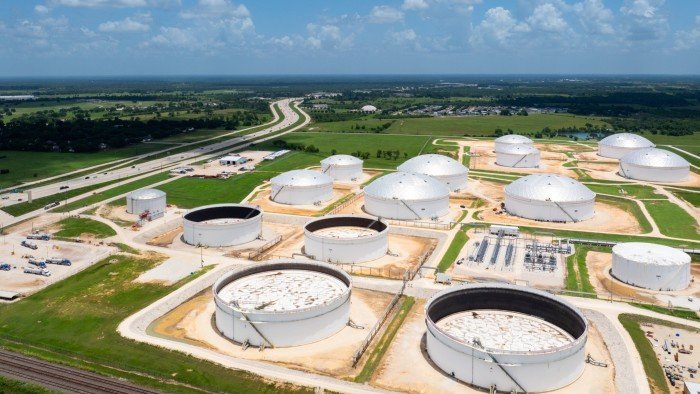Stay informed with free updates
Simply sign up to the Oil myFT Digest — delivered directly to your inbox.
Donald Trump called for an immediate boost to oil production on Monday, after crude prices briefly hit a five-month high in the aftermath of the US’s strikes on Iran.
The US president signalled his concern about oil prices on a day of volatile trading, with Brent crude, the international benchmark, rising as high as $81.40 a barrel at market opening, before dropping almost 4 per cent on the day to $72.83 by afternoon in New York.
“To the Department of Energy: DRILL, BABY, DRILL!!!” Trump said on his Truth Social network. “And I mean NOW!!!”
In a post earlier on Monday he wrote: “EVERYONE, KEEP OIL PRICES DOWN. I’M WATCHING! YOU’RE PLAYING RIGHT INTO THE HANDS OF THE ENEMY. DON’T DO IT!”
Despite suggestions from some Iranian hardliners that Tehran should respond to the US strikes by blocking traffic through the Strait of Hormuz, the channel for about a quarter of the world’s seaborne oil trade, crude supply from the Middle East is still unaffected by the escalating conflict.
The US marker, West Texas Intermediate, rose as much as 4.6 per cent to $78.40 on Monday before erasing those gains to trade down 0.2 per cent at $73.69.
Oil prices have risen about 10 per cent since Israel launched its first surprise attack on Iran 10 days ago. However, global crude prices are still lower than they were in January.
“So far, not a single drop of oil has been lost to the global market,” said Bjarne Schieldrop, chief commodities analysts at SEB. “The market is still on edge awaiting what Iran will do.”

Iran’s top military commander, Major General Abdolrahim Mousavi, has said Iran’s forces are entitled to retaliate against US interests, adding that America’s “illegitimate and aggressive proxy, Israel, will be punished”.
Further moves in the oil price this week will depend on the nature of that retaliation and whether or not the Islamic republic or its proxies, such as the Houthis, target energy infrastructure or shipping, analysts said.
Any attacks on shipping in the strait would immediately cause energy prices to soar, analysts said.
Iran has previously threatened to shut the strait, though analysts believe that it would struggle to completely block the waterway because of the presence of the US Navy’s Fifth Fleet in Bahrain.
“Security officials maintain that it would be difficult for Iran to fully close the Strait of Hormuz for an extended period,” said Helima Croft, a former CIA analyst who is now at RBC Capital Markets. “That said, multiple security experts contend that Iran has the ability to strike individual tankers and key ports with missiles and mines.”
Iran also uses the waterway to ship its oil to China and other buyers.
Two tankers heading into the Gulf have made last-minute changes of course to avoid the strait. The Coswisdom Lake turned around at 15.30 GMT on Sunday at the narrowest point of the strait, according to MarineTraffic, before making another turn and heading into the Gulf. The South Loyalty turned around three hours earlier and anchored off Khor Fakkan, a town in the United Arab Emirates, before also heading through the strait.
An alternative response by Iran could see it attack oilfields and infrastructure in US allies in the region, such as Saudi Arabia and Qatar. Anxious about getting drawn into the conflict, Gulf countries have repeatedly called for an end to hostilities and a return to dialogue.
In a statement on Sunday morning, Doha’s foreign ministry warned that the “dangerous tension” in the region could have “catastrophic repercussions”. Saudi Arabia said it was following developments in Iran with “great concern”.
Analysts at S&P Global Commodity Insights had predicted that Sunday night’s rally in oil prices would ease by Monday morning if there was no immediate Iranian response.
“The key question is what comes next,” James Bambino and Richard Joswick at S&P wrote in a note. “Will Iran attack US interests directly or through allied militias? Will Iranian crude exports be suspended? Will Iran attack shipping in the Strait of Hormuz?”
Even if Iranian crude exports were disrupted, increased production from the Opec+ cartel and current global inventories mean the oil market will remain sufficiently supplied, so long as the Strait of Hormuz remains open, they added.
Iran exports about 2mn barrels of oil a day. About 21mn barrels from Iran, Iraq, Kuwait, Saudi Arabia, Qatar and the UAE pass daily through the Strait of Hormuz.
Additional reporting by William Sandlund in Hong Kong and Robert Wright in London

